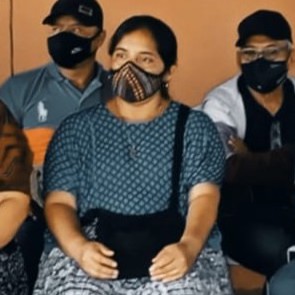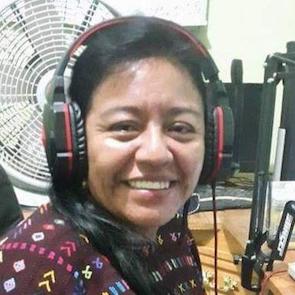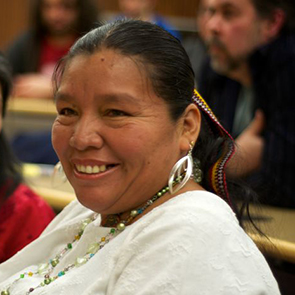New wave of violence and repression against human rights defenders, civil society organisations and journalists in El Estor, Guatemala
Front Line Defenders and the Unit for the Protection of Human Rights Defenders (UDEFEGUA) express their deep concern at the upsurge of violence against water and land rights defenders, members of the Maya Q'eqchi' communities, members of the fishing sector and journalists working in the municipality of El Estor, Department of Izabal. Of particular concern are the multiple raids, acts of intimidation, harassment, surveillance and defamation that form part of a broad strategy of repression by the State of Guatemala against those who have demanded the right to consultation in the municipality of El Estor.
The municipality of El Estor has the most important coastal and port region in Guatemala, located on the Atlantic Ocean in the Caribbean region. It is a region with significant diversity of natural resources and minerals such as nickel, and historically has been of significant economic interest, both nationally and internationally. In recent decades, activities such as mining and single crop cultivation have been promoted by companies and by local authorities who grant concessions for exploitation. These concessions have not taken into account the opinion or needs of the people and communities that have historically inhabited and defended the territory. The indigenous communities of the mostly Maya Q'eqchi' region who have worked in defence of their territory and in favour of the recognition of their collective rights, including the right to free and informed consultation, have faced serious reprisals for demanding their rights and for attempting to stop the negative environmental and social impacts of the exploitation in the municipality.
The mining projects have a history of serious human rights violations in the region. In 2007, the Canadian mining company Hudbay Minerales, owner of Compañía Guatemalteca de Níquel (CGN) carried out violent evictions against Q'eqchi' communities, including the community of Lote 8. During these, and other evictions in the municipalities of El Estor and Panzos. 11 Mayan Q'eqchi women reported that they were sexually abused by private security personnel of Skye Resources Inc. now part of Hudbay Minerals.
On 27 September 2009, teacher and human rights defender Adolfo Ich Chamán, who was part of the Lote 8 community and who, together with other communities, was defending their lands against the operations of the Hudbay Minerales company, was murdered in the vicinity of the mine by the company's private security. The murder occurred in the context of the evictions carried out against the Las Nubes community. Human rights defender Germán Chub Choc was also a victim of the attack against Adolfo Ich Chamán, and sustained wounds and injuries to his lower limbs which resulted in a long term disability and him being confined to a wheel chair. Both cases have followed a long judicial process that, despite abundant investigative evidence, have remained unpunished.
On 27 May 2017, following peaceful resistance against the operation of the mine due to the serious environmental damage it was causing in Lake Izabal, acts of violence and excessive use of force were recorded against the Artisanal Fishermen's Union of El Estor (Gremial de Pescadores Artesanales) by the National Civil Police (PNC). On 27 May 2017, indigenous and land rights defender Carlos Maaz Choc was killed while participating in a peaceful demonstration calling on the authorities to find a solution to the pollution of Lake Izabal. To date, the murder continues to go unpunished.
Following these events in May 2017, several judicial processes of criminalisation were initiated against the members of the Artisanal Fishermen's Union of El Estor, which to date, have presented multiple irregularities and judicial delays that have violated their rights to due process and the right to defence.
In 2018, the Artisanal Fishermen's Union and the Q'eqchi' Mayan people of El Estor opted to seek legal recourse to resolve their conflict with the Compañía Guatemalteca de Níquel (CGN) and the Ministry of Energy and Mines (MEM) over the Fénix mining project, granted to CGN, currently owned by the Russian-Swiss company Solway Investement Group. In 2019 the Constitutional Court (CC) granted a provisional injunction. In June 2020 the definitive injunction in favour of stopping the mining operations was granted in accordance with Convention 169 adopted by the International Labour Organisation. Despite this, the communities reported that the company never stopped its activities.
On 4 October 2021, the Q'eqchi' Mayan Ancestral Council set up a permanent sit-in at the entrance to the municipality and 10 km from the CGN processing plant to demand respect for their rights and full compliance with the Constitutional Court's ruling. During the sit-in, which lasted 20 days, different organisations and communities joined in to demand their rights. On 8 October, 4 days after the protest began, the Q'eqchi' leaders learned, from people in the community, that some unidentified people were attempting to identify the community members and social leaders who were opposed to the mine.
According to information reported by local organizations on 21 and 22 October 2021, the PNC used tear gas in an attempt to disperse the peaceful protest. This also affected all the houses in the neighbourhoods at the entrance to the municipality, with exposure to children, women, elderly people, and journalists.
On 22 October, the presence of security forces increased in the area and several aggressions were reported against journalists Carlos Choc, Baudilio Choc Mac, Juan Bautista Xol and Nelton Rivera Gonzáles who were reporting for Prensa Comunitaria on the events. Journalist Juan Bautista Xol, who covered the peaceful sit-in, was defamed by unknown individuals on social media for his reporting. On 23 October 2021, the Ancestral Council decided to end the sit-in. On 24 October 2021, in direct repose to the community protests, President Alejandro Giammattei declared a 30 day state of siege in El Estor, Izabal, under Government decree 9-2021, which allowed for a subsequent limitation of constitutional guarantees.
Local human rights organisations have been able to document and verify that between 24 and 28 October 2021, at least 14 raids were carried out on the homes of human rights defenders and journalists. These were carried out by Guatemalan Army, agents of the National Civil Police and a team of prosecutors from the Izabal Public Prosecutor's Office and the Special Criminal Investigation Division (DEIC). On 26 October 2021, at least 29 officers of the PNC violently raided the house of journalist Juan Bautista Xol and took his phone. That same day Carlos Choc’s house was raided by PNC officer and the Army.
On 27 October 2021, a contingent of armed security forces of the Guatemalan government entered the homes of human rights defender Angélica Choc and her son, Professor Luis Adolfo Ich Choc, without a search warrant, and carried out an illegal search. On the same day, the house of human rights defender German Chub Choc was raided by PNC elements. The human rights defender was disturbed while he was sleeping was was not permitted to get dressed and was denied the use of his wheelchair. Angélica Choc and Germán Chub Choc are human rights defenders who are plaintiffs in Canada against Hudbay Minerals in relation to past human rights abuses at the Fénix mine, including the murder of Adolfo Ich Chamán and the shooting of Germán Chub Choc by the mining company's security personnel in 2009.
On 27 October 2021, members of the PNC and elements of the army surrounded and raided the house of human rights defender Olga Marina Ché, a member of the Artisanal Fishermen's Union of El Estor, without a warrant. During the raid, the security forces threw the woman human rights defender's personal belongings on the ground and took her mobile phone; they also intimidated and physically assaulted the woman human rights defender's minor children who were in the house.
During the years 2020 and 2021 there has been a reported increase in security incidents against journalists in the country, including the repeated detentions of independent journalists from all over the country, such as the case of journalist Marvin del Cid, who in 31 March 2021, was detained and interrogated, by elements of the National Civil Police (PNC) in Guatemala City or the case of Mayan K'iche' indigenous rights defender and journalist Anastasia Mejía Tiriquiz, who last year was held under house arrest, on 22 September 2020 for the fabricated crimes of "sedition and aggravated assault" of which she was acquitted months later.
Front Line Defenders and UDEFEGUA underline the importance of police accountability and the right of human rights defenders and journalists to monitor, document and denounce human rights violations committed by the police and military in Guatemala.
Front Line Defenders and UDEFEGUA call on the Guatemalan authorities to halt and condemn police brutality against human rights defenders, journalists, peaceful protesters and their families. They also call for the rights of children, in particular those children who are members of the families of human rights defenders who have been raided, to be guaranteed in this context of State repression against whole communities.
Front Line Defenders and UDEFEGUA reiterates their condemnation of the police violence in El Estor and the disproportionate impact of violence against human rights defenders, their families and journalists in the country.
The organisations reiterate their call for the State of Guatemala to refrain from acts of repression and harassment against those who defend the right to free and prior consultation, and urge the adoption of effective protection instruments and mechanisms that recognise the valuable contribution that the work of human rights defenders and journalists make to the country's democracy.



